
 |
||
|
|
|
|
|
|
|
|
|
|
|
|
Frequently Asked Questions |
|||||||
|
 |
||||||
How do I know my child is ready for piano lessons? Please carefully consider the following if you are planning on enrolling your child in piano lessons:
I advise parents to explain to their children what the commitment of piano lessons entails in terms of time, weekly practicing and a long-term commitment. While students begin to play during the first lesson, the true gift of creating music at the piano is a lifelong journey of discovery, joy and passion.
|
|||||||
What age should my child start trumpet lessons? The general recommended age to start a child in trumpet lessons is 9 years. As with anything, each individual is unique and may be able to begin earlier than age 9. The lessons will focus on embouchure (the way you hold your mouth while playing), sound, style and proper trumpet techniques. The trumpet is perhaps the most versatile insrument in the brass family. Trumpet players can progress for jazz and pop to classical and rock. The trumpet is also more durable than many other instruments for children as it has fewer mechanical parts and is very sturdy.
|
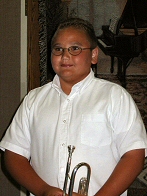 |
||||||
How much do lessons cost? One Student: $25 per half hour ($100 per month) Additional Students from immediate family: Monthly tuition is non-refundable and due the first lesson of each month. A detailed invoice will be sent home with the student a week prior to each new month. Any returned checks will be charged a $15 service fee. Your payment is holding a scheduled time slot each week for a lesson. If a lesson is missed, no make-up will be available. On the occasion that I have to miss a lesson, a credit will be given for the following month.
|
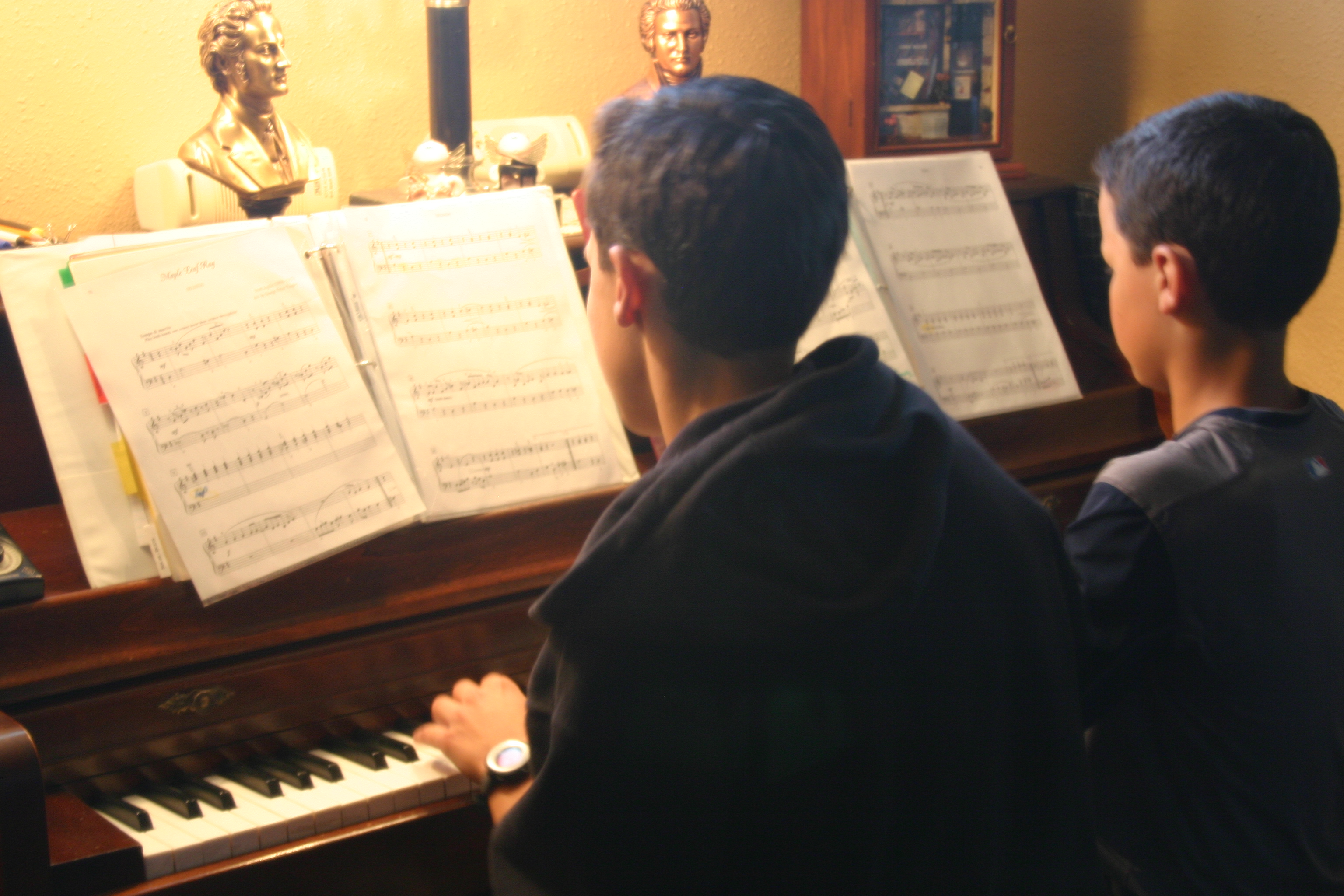 |
||||||
How much should the piano student practice? I strongly recommend practicing a minimum of 5 days per week, although every day is ideal. The focus of weekly practice is not just learning the notes of a song, but using dynamics, articulations, expression and style, working toward making music instead of just playing the notes. Music reading and finger strength are essential and need to be worked daily. Each student progresses as his/her own pace and ability. One of the major problems with children and music is the drudgery of practicing. Children must spend quality time practicing, setting goals and working on smaller sections in the music, not just playing through the songs. If the student just plays through the music and never gets into practicing smaller or more difficult sections, 20-30 minutes will seem like an eternity and they spend more time watching the clock than practicing with quality. Students learn in their lessons how to effectively practice and should implement these techniques at home. The following is only an approximate suggestion for amount of time to practice. Some may require more, some less: |
|
||||||
|
|
||||||
For instance, a child from ages 5-9 will probably practice anywhere between 10-30 min a day. As students get older and more mature, they should expect to practice 30-60 min a day. The serious minded students and/or career-oriented musicians will easily and enthusiastically practice 1, 2 or more hours a day. NOTE: Piano students who aspire to have professional careers in music and/or pursue music performance majors at the University level should be prepared to practice 3 to 6 hours daily as college entrance exams and competitions are rigorous and demanding. University/Conservatory piano life will be intense and competative. Sstudents who aspire to this level of musicianship should be prepared to spend significant hours during the day practicing. |
|||||||
How much should the trumpet student practice? Since trumpet players use the muscles in their lips (termed "chops") to play the instrument, each student will have a different length of time they can play without being overly fatigued. Trumpet playing is mostly air, but the ability to hold an embouchure for any length of time takes consistent practice to develop endurance (just like an athlete training for a race). Trumpet practice must be concentrated and focused, beginning with warm-ups and ending with a cool-down. Set the same time every day to practice so it beomes part of a routine or habit. For trumpet players, practicing more than once a day is ideal. This helps develop and condition the muscles. Many trumpet players play in a school band and/or orchestra. Practicing outside of those groups is essential. Students should practice the music they will perform with their groups in school, along with the music given in lessons. Beginning students will not be able to play very long at the start. Practicing 5-10 min two to three times a day is sufficient until they are able to play for longer periods of time. Ideally, beginning students should work up to 30 min a day, playing 15 min intervals twice a day. It is important to not skip days of practice because the muscles in the lips will go soft and it is difficult to build them up again. Practicing 6 days a week, 30 min a day is just right for the beginning - intermediate student. For more advanced students, 45-60 min a day 7 days a week is the minimum for successful progression and development. Breaking up practice sessions is helpful. For instance, 30 min after school and 30 min in the evening helps to build and develop the chops. NOTE: Trumpet students who aspire to have professional careers in music and/or pursue music performance majors at the University level should be prepared to practice 2 to 3 hours daily as college entrance exams and competitions are rigorous and demanding. University/Conservatory life will be intense and students who aspire to this level of musicianship should be prepared to spend significant hours during the day practicing.
|
|
||||||
|
|||||||
Do I need a piano or can I use an electronic keyboard?It is best to learn on an acoustic piano. If you or your child have studied longer than 12 months using an electronic keyboard and plan to continue, I strongly urge you to purchase an acoustic piano so that continued proper growth can occur. The action of the keys on an acoustic piano are different than the electric, no matter how weighted the keys are. NOTE: If you use an electronic keyboard, make sure it meets the following requirements, or you will be wasting time and money:
|
|||||||
Should I purchase or rent a trumpet? For those just beginning, renting is typically the better option. Many music stores have the rent to own option which is fine, but students continuing playing for more than 3 years need to upgrade to a better instrument. When purchasing a trumpet, used instruments will be substantially cheaper and many times are like new. Please consult with me before buying an instrument as the choice of make, model, brand can greatly hinder the students' progress.
|
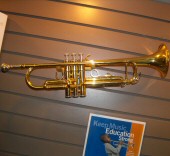 |
||||||
| What is the difference between student, intermediate & professional model trumpets?
Many companies manufacture student, intermediate and professional model trumpets. It is suggested that children just beginning use a student trumpet. Student model trumpets are designed for durability and easy production of tone. They are not as high in quality but are easy to maintain and considerably less expensive. They are a good choice for a beginner. Not all brands are equal - please consult with me before buying or renting a trumpet. Intermediate trumpets are "said" to be designed for those who are ready to move past the basics into more advanced playing. The intermediate trumpet line is really a marketing campaign to get you to spend more money thinking you are getting a better instrument. For the most part, the intermediate trumpet models are made to look like a professional model but are still built like a student model. I would advise against purchasing one. Professional model trumpets are made to meet the demands of a serious, more advanced player and are built to optimize playability. Typically, these instruments are built to the highest standards and use only the best quality materials. The options available for professional trumpets are extensive. Pro quality trumpets differ from each other primarily in weight, bore size (diameter of tubing), bell size, material and shape.
|
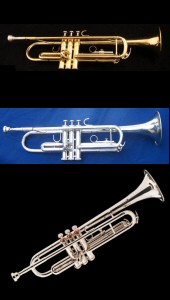 |
||||||
Is there a difference between gold and silver trumpets? Trumpets come in either a lacquer (gold/brass colored) or a silver plated exterior. The lacquer finish is on a buffed brass surface. Some believe that silver plate is considered better than lacquer because it dampens vibration less than lacquer does. Others believe that lacquer or silver plate makes no difference to how a students' trumpet plays. Silver plating will add to the cost of a student trumpet. High school students tend to have silver trumpets that are bright and shiny so it is the envy of the beginner to have the same. The silver plate is a flashier-looking finish and it can create a pride that inspires greater enthusiasm for learning and playing the trumpet. Ultimately, as a student progresses and becomes more advanced beyond secondary education, he/she will develop his/her own preference for finishes, brand, and model of trumpet. When choosing a trumpet to buy, it is ideal to play on many trumpets to determine which one is right for you.
|
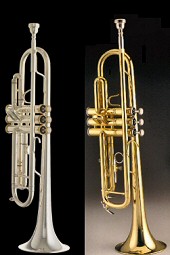 |
||||||
What if my child wants to quit? If your child makes a request to quit or is really struggling with learning the music at home, please let me know right away. Many times a change of music or practice regimen is all that is needed to get over a slump. All musicians experience slumps! Part of what we learn about ourselves through the discipline of music study is that we have the strength and ability to overcome difficult times. If, however, all attempts to identify the dissatisfaction have been explored, and your child still desires to terminate lessons, you may want to consider having them switch to another instrument. Not everyone is suited to the piano or trumpet. Most likely they would do well beginning another instrument as they already have knowledge of musical terms and notes. Piano students may wish to engage in a band or orchestra instrument and play at school with other kids their age. Playing in a group with others is fun and exciting, as well as rehearsing and performing regularly with their peers. |
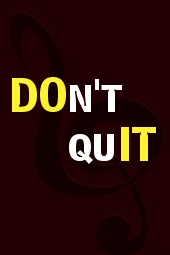 |
||||||
|
|||||||